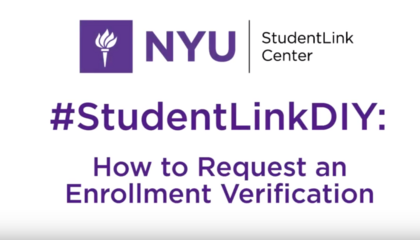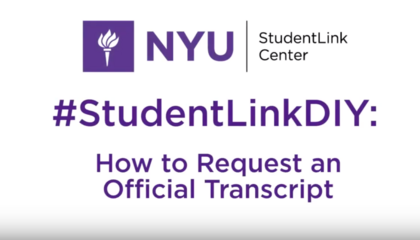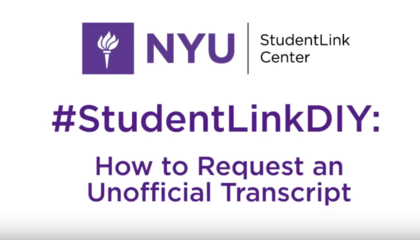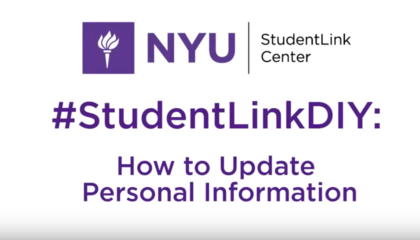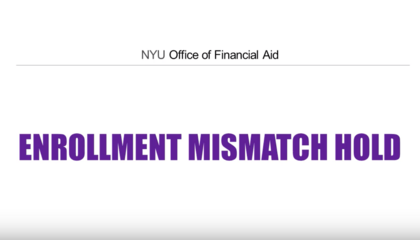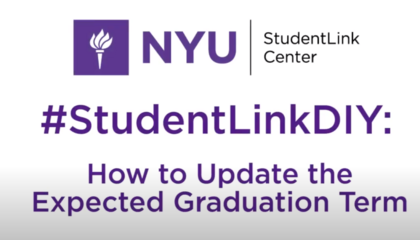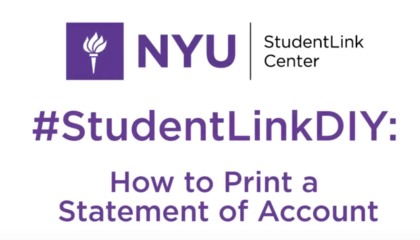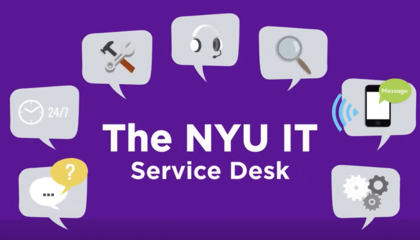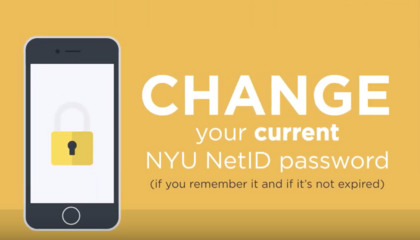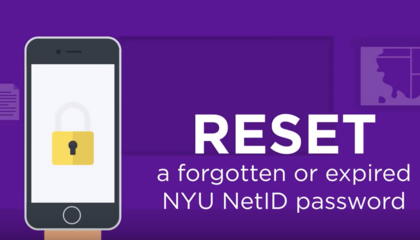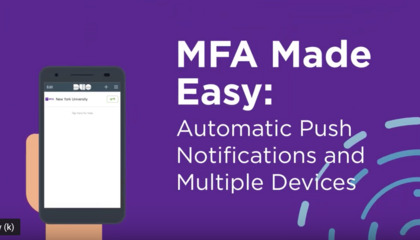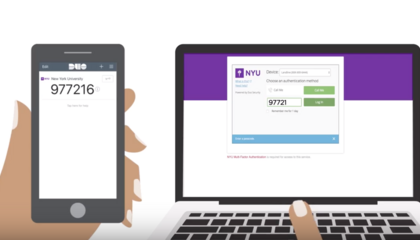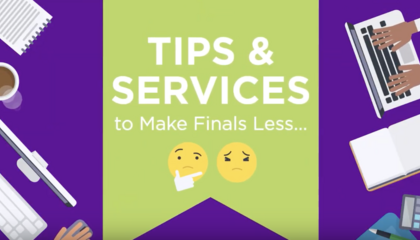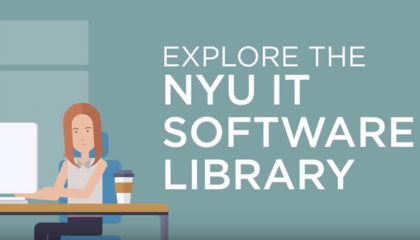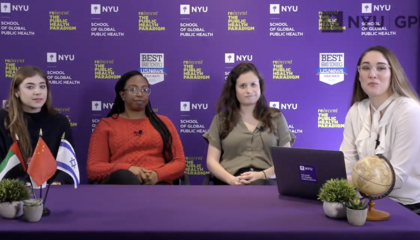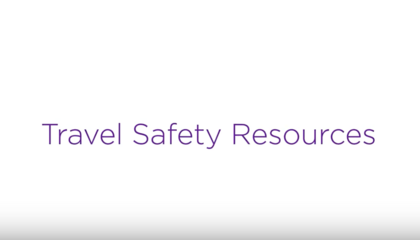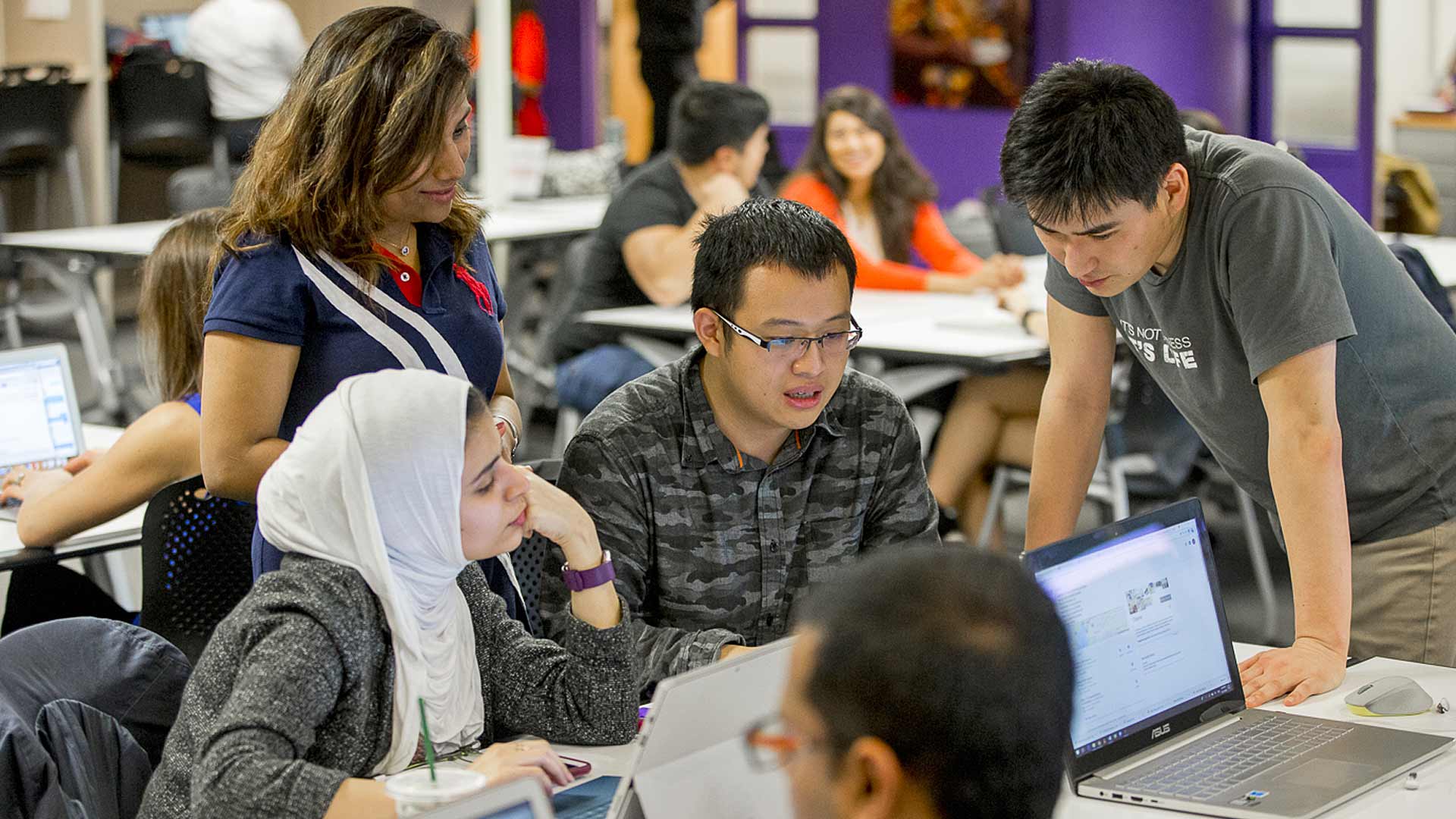
Quick Links
NYU StudentLink Center
Student services, simplified! The StudentLink Center is NYU's approach to student services. The NYU StudentLink Center is a comprehensive resource for students and their families to obtain information related to Registration, Financial Aid, Bursar, International Student Services and Global Programs.
Below are some of the most common services students use at StudentLink.
- Ask billing questions
- Make a payment
- Arrange a tuition payment plan
- Discuss eligibility for financial aid
- Review financial aid awards
- Receive guidance on financial aid planning
- Request official transcripts
- Receive financial literacy coaching by appointment
- Submit name/personal information changes
- Verify enrollment or degrees
- Connect with advisors to discuss study away options
- Drop off or pick up international travel or work documents
- Meet with advisors to discuss F1/J1 immigration status
To speak to a StudentLink Counselor, you can join our virtual line via text, our website, or coming in person to one of the two centers:
- Manhattan Office | 383 Lafayette Street, 1st Floor, New York, NY 10003
- Brooklyn Office | 5 MetroTech Center, Suite 201, Brooklyn, NY 11201
Office Hours:
- Monday, Tuesday, & Friday: 9 AM - 5 PM
- Wednesday & Thursday: 9 AM - 6 PM
Frequently Asked Information
See below for the most requested general services at the NYU StudentLink:
- Request an Enrollment Verification
- Request Official Transcript
- Request Unofficial Transcript
- Update Personal Information
- Passport Photo Services
- Notary Public Services
1 - Request an Enrollment Verification
Enrollment Verifications document a student's enrollment status in current and past terms. The verification document includes name, major, enrollment history (full-, half-, or part-time) and expected graduation date.
See the instructions here.
2 - Request Official Transcript
An official transcript is a comprehensive record of a student's academic progress at New York University. Requesting one is simple and can be done through NYU Albert.
See the instructions here.
3 - Request Unofficial Transcript
An unofficial transcript is a comprehensive record of a student's academic progress at New York University printed by the student themselves through NYU Albert. Please note that unofficial transcripts are not provided by StudentLink or the Office of the Registrar.
See the instructions here.
4 - Update Personal Information
Personal information such as primary name, legal sex, social security number and/or citizenship can be updated in-person at the StudentLink Center.
See the instructions here.
5 - Passport Photo Services
Your passport photographs can be taken and printed the same day. Every passport photo meets strict U.S. government requirements (2 inches by 2 inches). Please check to determine if these requirements also meet your consulate/application requirements. Payment must be made with a credit or debit card online prior to having your photograph taken.
6 - Notary Public Services
NYU affiliates may also receive free notary public services at both StudentLink Centers during our office hours. Please ensure you bring a government-issued photo ID when having documents notarized. It is important that documents remain unsigned until in front of one of our notaries.
Registration Guidelines
The NYU GPH class schedule is available on NYU Albert and on our GPH Course page.
For Registration dates and details, view the NYU Academic Calendar and the NYU Registrar.
Students should refer to the following registration instructions which guide students step-by-step through the registration process:
- Preparing to Register
- Registering on NYU Albert
- Important Waitlist Information
- Now Register!
- Important Registration Considerations
- Find your classroom
- Evaluate your Courses
- Transcript, Graduation & Change of Information
Note:
- For any registration questions send an email to GPH Registration at gph.registration@nyu.edu.
- For questions about the Enrollment Mismatch, please scroll down to the Financial Information section below.
1 - Preparing to Register
Always read emails from GPH Registration.
They include important information such as new course offerings, schedule and location changes etc.
Check your enrollment appointment day and time.
Registration appointments determine when a student can begin registration. Go to your Albert Student Center and at the top of the home page you will see the "Enrollment Dates" section. Appointment days and times are based on the Eastern Time zone. Appointments are prioritized by earned credit amount (excluding credits in-progress). If it’s not there, email registration@nyu.edu.
Check for registration holds in your Albert Student Center.
Some holds - like the Advisor Clearance Hold, Missing Credentials hold, or a past due balance - may block you from registration. Click on a Hold in the "Holds" section to see contact and resolution information.
- Advisor Clearance Hold (XAC): You need to meet with your advisor to discuss your schedule before you can register.All students have this for Fall, Spring and Summer.
- Missing Credentials Holds (RMC/RHS): The Registrar's Office is missing proof of your college graduation. Send your official transcript to gph.admissions@nyu.edu, 726 Broadway, 7th Floor, New York, NY 10003 or academic.records@nyu.edu. Until this hold is removed, you are not able to add classes, but can add them in your shopping cart or drop classes.
- Have not completed Sexual Misconduct Tutorial (XZ4): Students must complete the Sexual Misconduct Training to be able to register.
- Past due balance hold (See full list here). Contact the NYU Bursar's Office.
- Missing Immunization Records. Visit this page for more info.
Meet with your Advisor (check this page to learn more about you GPH program advisors) to discuss your class schedule.
Review the Registration Schedules
Check here the Academic Calendar, Withdrawal Schedules (Session Dates and Deadlines), Refund Schedule and Final Exam Schedule.
Review the GPH Policies & Procedures
2 - Registering on NYU Albert
See the tutorials below or visit this page.
Each section includes a video and text below it.
- Course Search | This search tool makes it easy to find the class you want, at the time you need. Another tool to use to find your class is to look at the schedule on our website. From the semester course schedule, copy the #Class (the blue number) and paste it in the enrollment box on NYU Albert Shopping Cart.
- Validate Classes | Validating the classes in your shopping cart allows you to check ahead of time if you will encounter certain obstacles when you go to enroll. The validate function checks to see if the classes in your shopping cart have time conflicts or if the class is restricted to a certain group. You do not need to wait until your enrollment appointment to use this feature; you can validate classes as soon as you place them in the shopping cart.
- Add Classes/Enroll | This tool allows you to add the classes you want to enroll. It will only appear if you have classes in your shopping cart
- Drop Classes | This tool allows you to drop a class. Check here the academic calendar to learn when the add/drop period ends for each semester. After that period, when dropping courses, students must be aware of the Tuition Refund Schedule. Tuition refunds are given according to the Bursar's schedule, and registration and service fees are never refundable once the term begins.
- Swap Classes | Swapping classes allows you to drop and add in one process. This is especially useful for section changes in multi-sectioned lab courses.
- Edit Swap | Designate (or change) a swap option for any of your waitlisted courses.
- Edit Enrollment | Change the number of units in a variable unit class or change to a different (open) section of a course's non-primary component (e.g., recitation, lab, and lecture).
- Waitlists | Students may choose to join a waitlist of a closed course during the registration period and until the add/drop deadline. Although the course will remain closed to other students, if/when a seat opens the waitlist process runs several times a day to enroll wait-listed students on a first-come-first-serve basis. The only way to get off the wait list is to wait to see if someone drops the class.
3 - Important Waitlist Information
- The wait list does not guarantee a seat in a course
- Students should enroll into alternate sections first
- The only way to get off the wait list is to wait to see if someone drops the class
- If a preferred section is closed with a waitlist option, students should enroll first into their alternate-choice section, and then use the swap function to place themselves onto the waitlist for the “first choice” section. Students can monitor their wait-list position via Nyu Albert student center by viewing “my class schedule”
- Students may drop themselves from a wait-list by following the same process for dropping an enrolled course.
4 - Now Register!
When you go to register, you simply have to click "Finish Enrolling" to complete the process.
NOTE: putting a course into your cart does not guarantee a spot - you must complete the registration process.
To avoid being closed out of courses or specific section, please register at your Enrollment appointment or soon after (we strongly recommend registering the first day of registration). If you wait, you will risk being closed out of courses.
5 - Important Registration Considerations
Course numbers vs. class numbers know the difference | Course numbers are the prefix of a course (ex: GPH-GU 2106 is the course number for Epidemiology). Class numbers instead are the numbers used to enroll in a course in Albert.
Review the course schedule | The easiest way to find a course on Albert is to look for it on our GPH Course Schedule (e.g., Fall 20XX Course Schedule) and enter in the class numbers into Albert. Be sure to look at the “Notes” section, which indicates any special dates, restrictions, codes needed, etc. for a course.
Review the graduate and doctoral course syllabi | Reviewing the syllabus of a course you are interested in will give you a lot of useful information.
Use the Shopping Cart and Validate tools prior to registration | Albert allows you to “pre-register” for courses, meaning you can go into the system as soon as courses are viewable in Albert. Select your courses, and add them into the “Shopping Cart" (accessible by clicking on the relevant semester tab).
Check the “Prerequisites” section | Prerequisites are set conditions required for enrollment into a course. Pre-requisite courses must be completed prior to enrollment. Co-requisites courses must be taken in conjunction with the requisite course during the same semester. Students will be blocked from enrollment into a course if set requisites are not complete or currently in-progress.
Time Conflicts | Students are not permitted to register for courses with conflicting meeting times.
Program Adjustments (Add/Drop) | Students may add or drop courses from their schedules until the published Add/Drop Deadline. Students process schedule adjustments via NYU Albert Student Center. A course dropped after the Add/Drop deadline is considered a Withdrawal, and withdrawn courses will remain in the student’s transcript with a grade of “W” (which has no GPA penalty).
Late Registration / Add / Drop Period | The first two weeks of a regular semester are considered “late registration” or the “drop/add period.” During this period, students are responsible for finalizing their registrations. Students who do not finalize registration by the published Drop/Add Deadline will not be permitted to enroll for that semester. Check here the academic calendar to learn when the add/drop period ends for each semester.
Course Withdrawal | Students may withdraw from a course (for a W grade) until the published withdrawal deadline using the Course Withdrawal Request. Students process withdrawals online via NYU Albert Student Center. Withdrawn courses remain on the student’s transcript with a grade of W which is not calculated into the GPA. Once entered on the student’s record, a W grade cannot be changed to any other grade.
An F grade is recorded for any student who ceases to attend a course without formally withdrawing in the required fashion by the deadline. Although formal approval is not required, students are strongly encouraged to consult with their advisor, Financial Aid Office, and OGS (if international) prior to withdrawing from a course. A course withdrawal may impact academic progress, delay graduation, or affect a student’s enrollment status, Visa eligibility, and financial aid eligibility.
Update your contact information in Albert | Go to your Student Center and click "Personal Info." You are required to have a current "NYU Emergency Alert" cell phone number and emergency contact to register. Students will not be allowed to register for classes without this information on file in Albert. Make updates in the "Personal Info" section of your Student Center.
Continuous Enrollment Fall & Spring Semesters | All students are required to be continuously enrolled each Fall and Spring semester until graduation. If you are not able to enroll for a term you need to formally file for a Leave of Absence in the NYU Albert Student Center.
J-Term & Summer Term | NYU GPH offers a selection of courses during the Summer Term and January Term (J-Term). These terms are optional, students are not required to enroll in courses. Note: courses offered during J-Term are three-week shorter-format courses that allow students to focus intensively on specific academic interests. Credits earned in J-Term counts towards the Spring semester.
6 - Find your classroom
Students may view classroom locations on their personalized class schedules via NYU Albert Student Center.
- Check your official class schedule: sign in to Albert, click on Student Center, and then My Class Schedule.
- Look for building and room number: your schedule will include an abbreviation for each class room and building. For example, if a lecture meets in room 101 of CANT, it will be at Cantor Film Center.
- To find the meaning of all building abbreviations, visit the Classroom Locations page and click on A-Z Listing to scroll through a full alphabetical list of NYU buildings.
- Use the Interactive Campus Map to view the mapped location of all campus buildings and their full address. Click on A-Z Listing to scroll through a full alphabetical list of NYU buildings.
7 - Evaluate your Courses
Course evaluations help foster a culture of dialogue around teaching and learning within the NYU community. Evaluation results provide students with information to help steer their academic choices, while faculty use feedback from the evaluations to improve their teaching practices and curriculum design. Student participation is key to this process: the more students who submit evaluations, the more helpful information is available to all.
Results from the Albert Course Evaluation tool are available to students via their Albert Student Center. After logging in, click the "Evaluation Published Results" link on the Home page.
8 - Transcript, Graduation & Change of Information
Transcript
- An official transcript is a comprehensive record of a student's academic progress at New York University.
- View this page to learn how to request it.
- For additional info contact transcripts@nyu.edu or 212-998-4280
Enrollment Verification
- It documents a student's enrollment status in current and past terms. The verification document includes name, major, enrollment history (full-, half-, or part-time) and expected graduation date.
- View this page to learn how to request it.
- For additional info contact certifications@nyu.edu or 212-998-4280.
Degree Verification
- It documents a student's enrollment history and their degree awarded. The document includes name, major, enrollment history (full-, half-, or part-time) and their graduation date and degree.
- View this page to learn how to request it.
- For additional info contact certifications@nyu.edu or 212-998-4280.
Change of Student Information
- View this page if you would like to change your personal information (Name, Address, Gender Identity, Pronoun and much more).
- For additional info contact registration@nyu.edu or 212-998-4800.
Graduation and Diplomas
- View this page to learn all the matters about graduation & diploma (How to apply to graduation, diploma delivery and much more).
- For additional info contact graduation@nyu.edu or 212-998-4260.
Pronouns and Name Pronunciation
Students now have the opportunity to add their pronouns, as well as the pronunciation of their names, into Albert. Students can have this information displayed to faculty, advisors, and administrators in Albert, NYU Classes, as well as other NYU systems. Students can also opt out of having their pronouns viewed by their instructors, in case they feel more comfortable sharing their pronouns outside of the classroom. To set up your pronoun visit this page.
Gender Identity in Albert
Students can indicate and edit their gender identity in their Albert Student Center. Students who would like to modify their gender identity on Albert or learn more should visit this page.
Financial Information
Financial Aid
At NYU, federal financial aid and student loans are awarded centrally through the Office of Financial Aid. They are your first point of contact for any question about financial aid.
- Financial Aid at NYU
- Types of Financial Aid
- How to Apply
- Applications and Forms
- Financial Aid and Your Bill
- Financial Aid Guide
- Frequently Asked Questions
To speak with a counselor you may:
- Visit this page for more info
- Email financial.aid@nyu.edu
- Call 212-998-444
- Visit their offices at 383 Lafayette Street, New York, NY 10012
Frequently Asked Information
See below for the most requested financial aid related services at the NYU StudentLink:
- Changing Enrollment Status
- Enrollment Mismatch Hold
- Update Expected Graduation Term
1 - Changing Enrollment Status
From an academic standpoint, you may change your enrollment status from full-time to part-time, or vice versa, without notifying the University.
However, your enrollment status may have implications for financial aid, particularly as it pertains to federal student loans. You must be enrolled in 4.5 credits or more to be eligible for federal financial aid. If you are enrolled in 9 or more credits, you should be eligible for the maximum amount of federal aid available to you.
If you receive federal financial aid and change your enrollment status, you should contact the NYU Financial Aid office at financialaid@nyu.edu or the StudentLink Center.
2 - Enrollment Mismatch Hold
The most common type of disbursement hold students encounter is the Enrollment Mismatch Hold. This occurs when the number of credits the Office of Financial Aid expects to see is different from your actual enrollment for the semester.
You can clear an Enrollment Mismatch Hold by following these instructions.
If you are having trouble in resolving the Enrollment Mismatch Hold or you have any questions about this, please reach out to financial.aid@nyu.edu.
Learn how to clear other disbursement issues by visiting this page.
3 - Update Expected Graduation Term
The term in which you expect to graduate is an important part of your student record, especially if you receive any form of financial aid. Verify or update your expected date of graduation on Albert.
Program Scholarship
Any scholarships that were awarded to you in the admission process will renew automatically each year, as long as you continue to maintain good academic standing.
For any question about the program scholarship, please email NYU GPH Office of Admissions and Enrollment at gph.admissions@nyu.edu
Bursar's Office
The Office of the Bursar is the central billing and collection point for New York University. The department is responsible for managing the university billing, collecting, refunding and cashiering functions.
Your NYU bill or the Statement of Account, can easily be printed from NYU Albert.
IT Services
NYU Information Technology (NYU IT) provides technology-based services and support for NYU students and all members of the University community.
Visit this page for an overview of the most popular NYU IT services for students. For a full list of NYU IT-supported services that are available for use by NYU students please see the Student page.
Have a tech support question? The NYU IT Service Desk is available 24x7 to answer your questions! For assistance with any of the student IT services, contact the IT Service Desk.
Frequently Asked Information
See below for the most IT requested services:
- Change your current NYU NetID password
- Reset a forgotten or expired NYU NetID password
- Multi-Factor Authentication (MFA) & Duo App
- Tips & Services to Help Wrap Up the Semester
- Free Microsoft Office for Students
- Virtual Computer Lab (VLC)
- Software Library for Students
1 - Change your current NYU NetID password
If you remember it and if it's not expired. For more information, please visit, this page.
3 - Multi-Factor Authentication (MFA) & Duo App
Multi-Factor Authentication (MFA) adds a second layer of security to help prevent anyone other than you from accessing your sensitive information online. This is accomplished using two types of authentication to verify your identity when logging into a system. Learn about the benefits of using NYU Multi-Factor Authentication (MFA). For more information by watching the vides below. For more information, please visit this website.
4 - Tips & Services to Help Wrap Up the Semester
NYU IT wants to help you across the fall finish line with useful IT services for that final paper, project, or exam. Visit this page for more information.
5 - Free Microsoft Office
NYU Students are eligible to receive a free copy of Office 365 for Education by visiting this website. Office 365 Education for free includes Word, Excel, PowerPoint, OneNote, and Microsoft Teams, plus additional classroom tools. You need to use your NYU email (YourNetID@nyu.edu). It’s not a trial!
6 - Virtual Computer Lab (VLC)
VLC provides NYU students with virtual access to academically relevant software applications (e.g., STATA, SPSS, Adobe etc.)
In order to access the Virtual Computer Lab (VCL) follow the instructions below:
- Access the VCL by logging into NYUHome, searching for the VCL card, then clicking GO or navigate to the NYU VCL website
- On the main page, click the Sign In button. This will redirect you to the NYU Login page, where you must enter your NYU NetID and password.
- Once you are logged in, you will be presented with a list of applications that are currently available to you.
- To launch an application, simply select the application you would like to launch. The application will either launch in a new tab or in a separate window. No installation of software is required.
For more guidance on how to use VLC visit this page.
7 - NYU Software Library
The Software Library includes software products that are licensed for distribution and use by eligible NYU community members. NYU negotiates with vendors to make software available at discounted prices or, in many cases, for free. Please refer to the individual product pages for eligibility, distribution process, support, and training documentation.
A full list of available software is available on the website.
Printing Services
The NYU Print Service is an easy-to-use, two-step process that broadens the NYU community's printing options while also conserving resources and helping the environment.
NYU Students have funds automatically added to their NYU ID cards: $50 for Fall & Spring, $25 for Summer and J-Term | (10¢ per sheet).
This service requires all students to have installed the NYU Print Services program on their computers.
NYU Print Services are available also at the GPH Student Space | 708 Broadway, 3rd floor.
For a list of all NYU Print service locations click here.
For instructions on installing the print service program click here.
➪ Print Instructions:
- Setup: Windows, Mac
- Give a print command as you usually do from any document and select NYU Print Service. For example, File > Print> NYU Print Service.
- Enter your NYU ID.
- Enter the title of the document you are printing (optional, but recommended if you are printing multiple documents).
- Select Print. You will see a dialogue box saying, “You will be charged $… for this print job.”
- Once you give the print command, you can retrieve your printouts at any printer on the network. Check all the NYU printing locations.
- At your selected printer, tap your NYU ID card to the ID reader. It will show the list of your print commands. Select the document you wish to print.
- Press Exit when you are done.
Study Spaces
NYU GPH Students have their own "living room" at 708 Broadway, 3rd floor complete with several workstations, whiteboards, and a printer. We also offer bookable study rooms for GPH students only via the GPH Student Affairs Skedda account.
The GPH Student Space is open from Monday to Friday from 7 AM to 9:30 PM for your use in the open area. The space is momentarily closed on Saturdays and Sundays (sorry!). You must reserve the study rooms in order to utilize the following private group study spaces.
Please keep in mind when booking Study Rooms 351, 353, 355, & 357 that there are 4 people maximum. As for Room 359, there are 10 people maximum.
➪ How do I reserve a GPH study room?
- Create an account through GPH Student Affairs Skedda. Log in with your NYU NetID.
- Provide your major/Concentration and N# (ex. N12345678) during the booking process.
- Enter your preferred time, date, & reservation length.
- Receive a confirmation email.
- Be sure to cancel your reservation if you are not able to utilize the space.
☞ Students may reserve a room for up to 2 hours at a time. You may reserve a room no more than 12 days in advance.
➪ Study Room Policies
Group and individual study rooms are a popular service. To help this work well for all students, please adhere to the following policies:
- These rooms are for GPH Graduate and Declared GPH UG Students only.
- The use of these study rooms should only be during your confirmed duration.
- Please keep the space clean and tidy including leaving the chairs and tables in place in the study spaces.
- You can use a study room without a reservation, but keep in mind that you may be asked to leave if a user with a reservation arrives.
- Rooms cannot be reserved or held by placing personal belongings in them. Materials and personal items left unattended may be removed by Student Affairs staff, GPH Operations, or NYU Public Safety.
- Group rooms may not be reserved or held for a single user only. Single users in a group study room (with or without reservations) will be asked to vacate the room for groups of 2 or more.
- Bring your confirmation email with you. Students with a reservation always have priority over walk-in users.
- There is a 10-minute grace period for reservations. If the reservation holder is not present within 10 minutes, the reservation is invalid.
➪ Additional Study Spaces
NYU Libraries provides other various study spaces; some can be reserved in advance, while others are openly available. Rental lockers are available to all NYU students; graduate and Ph.D. students have access to additional spaces.
- Graduate Study Spaces | Bobst Library has many reservable groups and individual study rooms for graduate students, located on Lower Levels 1 & 2, and Floors 4, 6, 8, and 9. These rooms include our graduate collaboratives and dissertation writers’ rooms.
- Reservable Study Spaces
- Lockers: Bobst Library
- Bobst Charging Stations
See here other Study Spaces available to NYU students and check this GoogleMap that also includes non-NYU locations:
Travel Abroad
A crucial aspect of reinventing the global health paradigm at GPH is experiencing the world’s health challenges first-hand to design and implement unprecedented, population-based solutions.
As a GPH student and part of NYU’s global network, your unparalleled opportunities for travel expand your exposure to diverse perspectives and approaches to public health, enabling you to experience the field in action. From immersive courses offered from London to Australia to international internships with top organizations like the United Nations or the World Health Organization, no matter where you are in your academic journey, your trip has only just begun.
Where Can I Travel?
Each of GPH’s academic programs offers unique opportunities to travel the world and get boots-on-the-ground training and cross-cultural education. Learn more about studying abroad during each of them to find what suits you and your goals best:
- Doctorate
- Master of Arts in Bioethics
- Master of Public Health
- Undergraduate
Study Abroad Courses
GPH offers courses abroad throughout the year in several of our Global Network sites and beyond. You’ll get a chance to immerse yourself in another location and culture while also enriching your educational experience. Courses are open to students in the MPH program, some non-MPH graduate programs, and senior-level undergraduate students.
For more information about courses abroad for graduate students at GPH (FAQs & past semesters' courses) visit also the GPH Study Abroad page.
If you have any questions, please contact us at gph.global@nyu.edu.
While NYU makes every effort to make sure that all of our travel sites are safe for students and faculty alike, it is important to be aware of travel warnings and advisories for your nationality. Once you are registered in NYU Traveler, NYU can monitor that country and make necessary arrangements, if needed, in the time of an emergency, as well as send you alerts when necessary.
Health & Safety
New York University provides resources to help you during your travels, including destination-specific safety awareness briefings prior to departure and real-time monitoring and notification of emerging events to impacted travelers.
➪ Counseling Abroad
Everyone who goes abroad has issues with adjustment. You may feel overwhelmed, homesick, afraid, or even depressed. Most people take time to adjust to the new culture, living arrangements, food, language and submersion in the unfamiliar.
Because the availability and reliability of counseling vary from one country to another, please consider contacting NYU’s Wellness Exchange at (212) 443-9999) or wellnessexchange@nyu.edu for health/mental health referrals abroad. The Wellness Exchange also offers a private, 24/7 hotline (212-443-9999) that puts students in touch with professionals who can help them address day-to-day challenges as well as other health-related concerns including medical issues, academic stress, depression, sexual assault, anxiety, alcohol and other drug dependence, sexually transmitted infections, and eating disorders.
➪ Awareness & Safety
Just as in New York City, the same good-sense safety measures apply in all cities:
- Be aware of your belongings and only bring out what you need.
- Never walk alone at night
- Share your plans with staff and family, including where you are going and when you expect to return.
- Bring an extra copy of your passport with you, and keep it in a separate location.
- Avoid underage and excessive alcohol consumption
- Don’t import, purchase, use, or have drugs in your possession
- Obey the local laws. If you find yourself in a legal jam, contact the closest U.S. consulate, U.S. consular agency, or the U.S. embassy for assistance. Keep in mind, U.S. consular employees cannot arrange for local officials to release detained American citizens.
- Only use licensed and regulated taxis
- Do not carry weapons
- Avoid participating in demonstrations and other political activities
- Stay safe and secure in your residence by closing and locking doors at all times.
- Practice ATM security by using them during the daylight when possible and using only bank-affiliated ATMs.
- Be aware of pickpocket situations in crowded areas e.g. subways.
Consider the following measures for added safety before you begin your trip:
- Register with NYU Traveler for free
- Register with the US Department of State’s Smart Traveler Enrollment Program (STEP) for free
- United States State Department Travel Advisories
- United States State Department Travel Checklist
- United States State Department Country Specific Information
➪ Food and Water Safety
New ingredients and different water and sanitation conditions in other countries can sometimes lead to discomfort and even the contraction of diseases. While these factors vary from one country to another, the best preventative measures are taking extreme precautions with food and water. Some measures to consider include:
- Only drink and use boiled water, or bottled water served in a vacuum-sealed plastic bottle. If boiled/bottled water is not available, treat water with iodine tablets
- Avoid ice cubes or food served on ice, and drink through sanitary straws when possible.
- When showering, try not to allow water inside your mouth
- Wash your hands with soap and hot water or sanitary wipes before eating
- Avoid uncooked vegetables and salads
- Thick-skinned fruits (bananas, oranges) are safer than thin-skinned fruits (apples, pears)
- Eat only well done meats, poultries and fish
- Avoid unpasteurized dairy products and milk. Check the date on bottled milk.
If you get do experience stomach discomfort, consider taking these steps to help alleviate symptoms:
- Drink tea and carbonated beverages
- Mix oral rehydration solutions or pre-packaged electrolyte mix in safe water
- Try eating bananas and cooked rice
- Start an anti-motility drug (Pepto-Bismol or Imodium).
- If no improvement occurs after 2-3 days, consult a local physician and consider starting antibiotics, as prescribed.
➪ Additional Health Resources
1. Centers for Disease Control and Prevention (CDC) Travelers' Health
- Illness and Injury Abroad
- Food and Water Safety
- Your Survival Guide to Safe and Healthy Travel
- CIA World Fact Book
2. U.S. Department of State International Travel Information
3. World Health Organization (WHO) International Travel and Health
Cultural Immersion & Competency
Keep in mind that every country and region has different expectations when it comes to dress standards, speech patterns and behavior. Make sure you think about how your new culture differs from what you are used to, and plan accordingly to ensure your own comfort and safety.
➪ Preparing for a New Culture
Here are a few questions* to ask yourself about your host country and culture. Spend some time before you depart researching your host country to answer them, and think about them while in your host country.
- How many people can you name who are prominent in the affairs of your host country (politics, athletics, religion, the arts, etc.)? Who are the country's national heroes and heroines?
- Are other languages spoken besides the dominant language? What are the social and political implications of language usage?
- What is the dominant religion? Have you read any of its sacred writings? What are the most important religious observances and ceremonies? How regularly do people participate in them?
- What are the attitudes towards drinking, gambling, other religions, divorce, etc
- Is the price asked for merchandise fixed or are customers expected to bargain? How is bargaining conducted?
- How do people organize their daily activities? What is the normal meal schedule? Is there a daytime rest period? What is the customary time for visiting friends?
- What foods are most popular and how are they prepared?
- What things are taboo in this society?
- What is the usual dress for women? For men? For students? Are slacks or shorts worn? If so, on what occasions?
➪ Cultural Competency
Here are some potential ways to increase your intercultural effectiveness so you can fit into your surroundings and make a good impression on the people you meet:
- Maintain a positive attitude: do not complain about living and working conditions; remain calm, patient and in control of emotions when confronted by obstacles to the achievement of the assignment’s goals; avoid negative evaluation of local colleagues and organizational structures in the absence of investigating or proposing feasible solutions; display a sense of humor, without sarcasm, about the culture shock you may experience
- React/respond to unfamiliar situations in a manner that is consistent with local customs; deal with stress in a positive manner
- Understand differences and similarities between rules of socializing in home country and host country
- Be cognizant of negative images of foreigners and try to avoid behaving according to these stereotypes; assess and sensitively resolve differing expectations of how foreigners and host nationals perceive their roles
- Don’t be afraid of making social or linguistic mistakes – willingly engage with host nationals and ask for help/laugh about it
- Learn local greetings/basics of the local language
Travel Advice
➪ Program Preparation/Destination Research
No matter the reason, it is always wise to research your travel destination. Information you want to understand and have in advance:
- Local metro and transportation system (costs, closest stations)
- Currency Exchange
- Tipping
- Taxis
- Maps
- Emergency numbers (police, fire, ambulance)
- Local norms for bargaining
- Acceptable attire
Bring a pocket-size travel guide for easy references. Here are some online recommended guides.
➪ Money and Banking
Credit card fraud and scams are common throughout the world and tourists are advised to be careful not to allow a member of the public to assist them when drawing money from ATMs. If you intend to use traveler’s checks be aware that there will be a charge to cash them.
It's always advisable to bring money in a variety of forms: a mix of cash, credit cards, and traveler's checks. You should also exchange enough petty cash to cover airport incidentals, tipping, and ground transportation before you leave home, or withdraw money upon arrival at an airport cash machine.
In many international destinations, cash machines offer the best exchange rates. Avoid exchanging money at commercial exchange bureaus and hotels, which often have the highest transaction fees.
You should check with your banking institution to ensure that your credit card can be used where you are traveling.
Don’t forget that credit cards often charge a foreign transaction fee.
➪ Phone
International calls are very expensive. Phone cards are a better option and local SIM cards are much better options. You can easily purchase these at the airport.
Check with your US cell phone service provider to ensure that your phone will be unlocked to use a foreign SIM card before you leave the US. Alternatively, you may also purchase a ‘throwaway’ phone upon arrival or in advance to use with a foreign SIM card.
If you choose to use your US cell phone with your US service plan while abroad, be sure to contact your service provider before traveling abroad regarding roaming charges, as they can be quite pricey, even with a special international service plan. Make sure you turn off roaming on your phone. Other phone call options include WhatsApp, Skype, or magicJack that can only be used with WiFi and will ensure you don’t have excessive phone charges.
➪ Packing Suggestions
- Research your destination to determine culturally accepted attire and climate.
- Choose sturdy luggage on wheels, or a durable backpack. Label it properly with your name, email, address and mobile number, and add a color tag, ribbon, etc., so you can easily determine that is your luggage.
- Consider bringing a small box of laundry detergent to wash some items by hand- on longer trips and when carrying a heavier bag is not ideal.
- Depending on locations, don’t forget: rain jacket/poncho, bug spray, sunscreen, hat, long sleeve cotton shirt, extra socks
- You should always pack: hand sanitizer, small flashlight, small battery operated alarm clock, closed toe comfortable shoes/sneakers, small backpack to carry throughout the day, money wallet(s).
- Bring an extra pair of contact lenses and solution, and glasses
- Review federal guidelines on which items and sizes can be packed in your carry-on verse your checked luggage.
- Always carry one extra pair of clothing, daily prescriptions in original bottles, and toiletries in your carry-on in case your luggage is lost.
- Double-check your destination for any restrictions on prescribed medications. You may be required to obtain a doctor’s note to accompany your prescription.
- Don’t pack your passport and important travel documents in your checked luggage. Make sure important information is readily available in case you are asked to provide documentation at passport and border patrol.
- When packing toiletries, make sure you only pack the essentials in a small plastic bag. Squeeze out the extra air out of bottles and tubes to avoid leaks during air travel.
- Don’t pack your suitcase so there is no extra space to bring items back to the US. You may acquire some souvenirs or gifts and don’t want to exceed your luggage allowance.
- Put together a small personal first aid kit in a sealed plastic bag: band aids, over the counter cold or allergy medicine, anti-motility medication, oral rehydration packets, pain relievers, hydrocortisone cream, Pepto-Bismol, motion sickness, feminine products, individually packed alcohol wipes, small roll of toilet paper and facial tissues.
- Don’t bring your most expensive jewelry, purses, wallets, shoes, etc., on short trips. You can go without these times rather than risk having them lost or stolen since your accommodations might not provide a room safe.
Important Contacts & Resources
➪ Questions about Immigration & Visa? | The Office of Global Services (OGS) is the resource at NYU for immigration and visa questions.
➪ Register with NYU Traveler for free! | NYU Traveler was created to provide the NYU community with tools and services for their travel needs and to help keep them safer.
➪ NYU Contact Numbers for Global Sites | To report a student emergency at any NYU location in the world, call NYU’s Department of Public Safety at (US 011) 212-998-2222 (24 hours). Add this number to your contacts. It is also located on the back of your NYU ID card.
➪ United States Embassy | Find your local US Embassy here.
➪ Have an Urgent Health Question? | Contact NYU Wellness Exchange at +1-212-443-9999 or wellness.exchange@nyu.edu.
